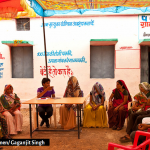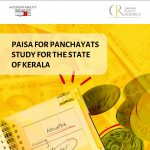
Inside Districts Series: Voice of a Sarpanch in Bihar
4 May 2020
As the Coronavirus pandemic sweeps through India, districts are being tapped by the government for timely detection and reporting of cases, and prevention. Our ‘Inside Districts’ series will feature interviews of Block-level officials, panchayat functionaries and frontline workers to understand their challenges and best practices.
The Accountability Initiative at the Centre for Policy Research is currently operational in five Indian states. For part 11 of the series, our field staff spoke with a Mukhiya (also known as Sarpanch) in Gaya, Bihar.
The interview was originally conducted in Hindi on 10 April 2020, and has been translated.
Mukhiya or Sarpanch
The Mukhiya also called Sarpanch is an elected representative and the chairperson of the Gram Panchayat, the village-level constitutional unit for local self-governance. As per the 73rd Amendment to the Constitution of India (1992), Panchayati Raj Institutions have been constituted at three levels: Gram Panchayat at the village level, Block Panchayat or Panchayat Samiti at the intermediate level, and District Panchayat or Zila Parishad at the district level. The Sarpanch along with other elected representatives at the village-level, such as Ward Panches, are elected by the Gram Sabha, which consists of all the registered voters across the Gram Panchayat. Elections must take place every five years and Sarpanch seats are reserved for Scheduled Castes, Scheduled Tribes and women in different Gram Panchayats in rotation.
The 73rd Amendment mandates states to decentralise control over funds, functions and functionaries pertaining to 29 subjects listed in the Eleventh Schedule. State legislatures have devolved powers and responsibilities to varying levels across different states. The Sarpanch plays a key role in participatory planning, budgeting, administration and monitoring of development and poverty alleviation programmes. Sarpanches can also take the lead in addressing citizen’s grievances and implementing innovative programmes at the village level, such as the ‘Janta Information System’ for MGNREGA highlighted by us in this report.
To learn more about the status of devolution and transfer of funds from states to panchayats, read our report for the Fourteenth Finance Commission.
Q: When did you first get to know about COVID-19?
Mukhiya: I got to know about it in February in a meeting conducted by the Block Development Officer (BDO).
Q: What are your COVID-19 related tasks?
Mukhiya: I read in the news that all the Mukhiyas have to get masks made in their Panchayats and also sanitise the Panchayat. For this, the government is providing monetary help to the Mukhiya. However, as of now, nothing has been done here.
Huge isolation wards have been made in my area for people who are coming from outside.
Q: Are you encountering any challenges?
Mukhiya: I have been asking people to stay at home but they are not listening to me. People are still gathering in the village to play cards.
In my Panchayat, farmers are trying to sell vegetables in the morning but the police beat them up and ask them to disperse. Wheat crops are ready to be harvested but farmers are not getting labourers.
Q: Have you observed shortages?
Mukhiya: There is a huge shortage of green vegetables. Black marketing of ration has also increased tremendously. As far as I am aware, there is no availability of masks or sanitisers. [Note: interview till April 10]





